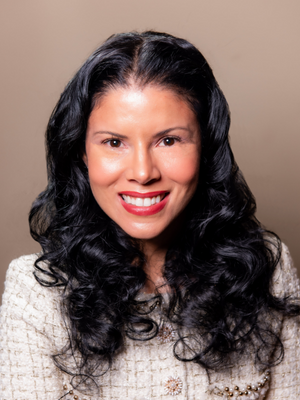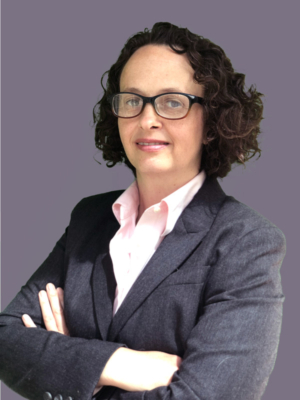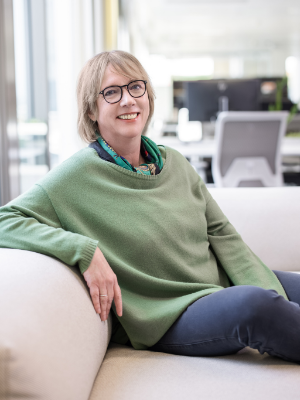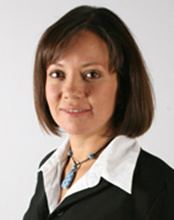 “My career trajectory is a combination of two factors. The first is that I am standing on the shoulders of people and organizations who have sponsored me and have opened doors for me to join rooms, organizations and functions that I otherwise would not have been able to,” says Indhira Arrington. “The second is that while I was fortunate to have those opportunities present themselves, I was also prepared and motivated to seize those opportunities.”
“My career trajectory is a combination of two factors. The first is that I am standing on the shoulders of people and organizations who have sponsored me and have opened doors for me to join rooms, organizations and functions that I otherwise would not have been able to,” says Indhira Arrington. “The second is that while I was fortunate to have those opportunities present themselves, I was also prepared and motivated to seize those opportunities.”
Stepping Up to Opportunities, All the Way to the C-Suite
Instilled with a strong work ethic by her family and driven to prove herself as an immigrant in a new country, Arrington was determined to perform at her best and demonstrate her value from early on.
“Being an immigrant really is at the core of my experience,” she says, “Even though I’ve now lived in the U.S. longer than I lived in the Dominican Republic, I distinctly remember that feeling of being an ‘outsider.’”
With her parents speaking little English and no precedent for success in corporate America, Arrington’s “second family” at INROADS set her up with the mindset and skills that enabled her to perform at a high level (academically, as a 4.0 student) and step up to opportunities.
With both the prodding of her INROADS mentor and with the sponsorship of The Consortium, she received her MBA at NYU Stern School of Business before taking on sales and trading roles at Citi and Morgan Stanley: “I didn’t know what I didn’t know, and I was fortunate to have people who saw my potential as much bigger than I did. They pointed me in different directions.”
While building her career on the trading floor, Arrington says that DEI was her steady second job. As a “double only” Latina in the room, she was often called on for diversity conferences and networking needs. She wanted to show up and open doors for others, too.
Then came a crossroads of choice.
“Sales and trading was where I could have maximized my earning potential, but I faced the difficulty of having the intensity that job required and being the type of mother I wanted to be,” reflects Arrington. “I was very good at my job, but it didn’t fit with how I wanted the rest of my life to play out.”
Coinciding with the economic downturn and start of her family, Arrington shifted into diversity, equity and inclusion (DEI) as her primary career focus in 2009 – first at Bank of America and then Wells Fargo, before taking her present role at Ares Management Corporation as Global Head of DEI in 2021.
“There are thousands of people that are good at their job and that want to ascend the corporate ladder, but doing it alone likely won’t get you there,” she says. “You also need to have strong executive presence and act like a leader, and then hopefully that combination gains you the sponsors who have the power to open those doors, propel you and pull you up.”
Becoming an Impact Player
As a constant learner, Arrington has focused on becoming the subject matter expert of her craft. Once she realized she could be vulnerable, ask for help and not figure everything out by herself, it was a game-changer in advancing her learning curve: “I always say to my team that when I don’t understand something, even today, explain it to me like a five-year old.”
A key principle she abides to and encourages in her team is to be in service of others: Don’t aim to be basic. Aim to be exceptional.
“Anybody can do what they are told and put the spreadsheet together. But if you’re in the service of others, you’re going to ask the next question about what they are trying to do and the end goal,” she says. “You take the work to the next level, and in doing so, you build good will and advocates who will remember you.”
Whether it’s volunteering to bring in great talent, working with ERGs, or taking the initiative to fix a broken process, Arrington suggests to ask, “Outside of your day job responsibilities, what are you doing to contribute to the greater good of the organization and to make yourself an impact player? Anybody can get work done. People want to promote impact players.”
Leveling Up To Advance Your Career
Arrington emphasizes that leveling up requires the maturity of being open and direct about what you need and want and what your expectations are, and not just expecting your boss (or anyone) to be a mind-reader.
Owning what you want also means learning to “manage your manager” – putting your objectives and goals out, and then soliciting the clear guidance on where you need to focus on developing your skillsets and capabilities to be able to reach your goals. Find out what might be getting in your way and what superpowers you need to double-down on to excel.
“Be unapologetic and say this is what I’m thinking, but also leave space in the room for your managers to say ‘maybe you’re thinking too small’ or ‘maybe you’re thinking too big.’”
Thirdly, Arrington has learned from experience that “the unwritten rules are real.” Knowing the difference between titles, influencers and key decision-makers, as well as knowing the personalities you are interacting with, is essential when it comes to succeeding in advancing your ideas as you rise to bigger roles where more is at stake and few ideas get funded.
“Pre-selling your idea to the right individuals and setting yourself up to succeed is so critical, but women often don’t focus enough on that,” she observes. “We focus on the best idea and presentation and assume everyone is going to like it. The pre-game and understanding how things really get done in your organization is key.”
Arrington encourages women to have a portfolio of sponsors and advocates you spend time with and who know the value you deliver, and be more strategic in building your network. She observes that men tend to build diverse networks that create a matrix intentionally directed towards where they want to go, whereas women tend to build their networks around proximity and likeness. Leverage your network as an opportunity to put your intentions out there to those in the places you want to go.
Impacting Change as a Latina
“As Latinas, we’re bred to be loud and we’re bred to sit in our truth,” laughs Arrington, reflecting on her cultural capital.
As a Latina woman she’s brought her personal experiences to the table: “There’s nothing like breaking down barriers by being vulnerable and telling your personal story of microaggressions and how you have been made to feel less, unwelcome or like you don’t belong in situations. It changes the way that reality lands when a person realizes that somebody that they know isn’t having the same experiences that they are.”
For two decades, Arrington has sat on the board of directors for the Committee for Hispanic Children and Families, supporting Latinos in New York around school, work and childcare. She is currently the Vice Chair for the Council of Urban Professionals (CUP), focusing on supporting women and people of color to leadership roles in corporate organizations. Her experience of feeling like an outsider has inspired her towards actions that bring about change.
While successful in overcoming obstacles, Arrington admits it has been challenging at times to be the only Latina in a room: “That’s where vulnerability came in. Without somebody that would have a naturally predisposed affinity towards me, I had to figure out how to break down barriers to be let in and be embraced even though I was different,” says Arrington. “It’s much easier when you feel that level of comfort and connectedness.”
Why Managing Is Really Coaching
Arrington jokes that she cannot have a boss who doesn’t want to be her friend, but she also means it: “If you don’t know me and you don’t understand what drives me and what ails me, then how could you truly be in charge of growing me and taking me to the next level?”
She continues, “I think it’s really important as managers that we take the approach of being coaches and changing the relationship from ‘I’m here to manage and make sure you do what you’re supposed to do’ to ‘I’m here to coach you and make sure that you exceed that.’”
In a coaching relationship, honest feedback can be received as care and guidance with your best interests at heart.
“Most managers feel like I can’t get too close because then I can’t be objective, and I think it’s the opposite,” says Arrington. “If you’re not close enough, you’re going to miss what’s happening and you’re going to miss opportunities to support people in a way that makes them want to come to work and be part of the community.”
Having often felt she had to prove herself along her journey, she would have a simple message to her younger self: “Stop being so scared. Try to enjoy it more along the way. You are worthy. You are good enough. You’re more than good enough.”
These days, Arrington practices giving herself grace on a daily basis. With her twelve and nine year-old sons playing flag football on the weekends, Arrington confesses to be that sports mom cheering on the sidelines with a cowbell. She enjoys yoga and learning through documentaries, and is an avid reader when she can sneak a few chapters in.
By Aimee Hansen





